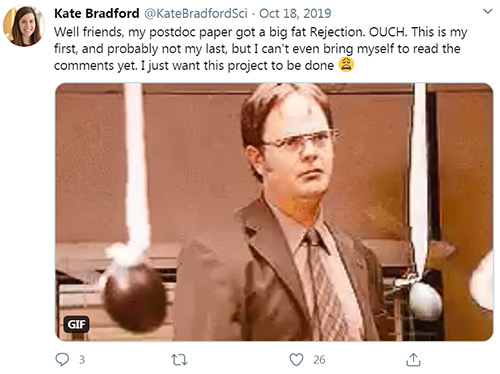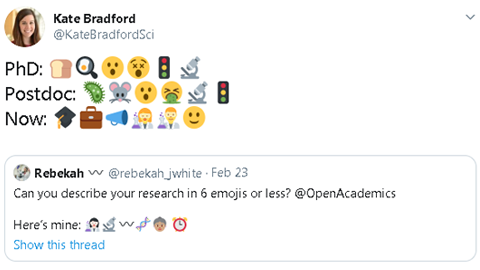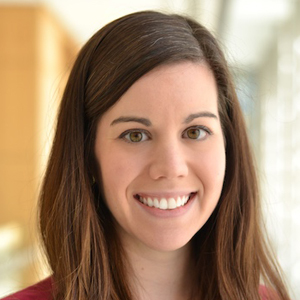Science Twitter:
Personal boundaries
on a professional platform
“Do I have to stop posting my critiques of higher education?”
“Will the leadership take me seriously if I use GIFs?”
“Am I still allowed to Tweet about cats?”
These are a few of the questions I had to navigate when I began my career as a professional development staff member at Johns Hopkins University in fall 2017. To develop my science communication skills, I had started my professional Twitter account a few months earlier when I was a postdoc at the U.S. Food and Drug Administration. I was pleased to learn that many Hopkins faculty, students, staff and leaders use professional social media accounts too. This empowered me to turn my Twitter account from a professional hobby into a critical part of my job. Twitter enabled me to grow a robust network at Hopkins, advertise my and my office’s programming, and keep up with the latest research and news in my field. Among other things, I now get paid to tweet. Pretty cool, right?
Wrong. Twitter is a social networking platform. Success on Twitter has a different definition for every Twitter user. For me, success meant finding the perfect balance of personality: one that is professional, intelligent and advocates on behalf of meaningful causes but is still likable and relatable. Every day, I pressured myself to produce worthy, professional content, maintain my network with the right stakeholders and self-promote (in a non-icky way). I found myself drafting and deleting about three times as many tweets as I published, because I was so scared about my public image.
For example, one weekend there was a heated debate on Twitter about the proper way to, or not to, advertise open postdoctoral positions in labs. I wanted to respond to tweets from those who disagreed with my view on the subject. I struggled with how to express my own opinions and share the common struggles I see graduate students encounter when applying to postdocs, but I feared it wasn’t my place to speak up. I spent far too long trying to write, rewrite and rewrite again my responses. Once I posted a response, I would second-guess myself. Making the whole situation even worse, the debate took place over the Thanksgiving holiday, a time I didn’t want to spend thinking, and stressing, about work.

I struggled with how my own personality, sense of humor, personal stories and opinions fit in with this professional account, especially since I’m a private person and don’t wish to share many details of my life online. Much of this pressure is self-inflicted; I’ve never felt oversight from university leadership about my account. However, in our current callout culture, Twitter users are quick to highlight and shame those who express unpopular or problematic opinions on social media. Sometimes this results in employers being notified and people losing their jobs. You can feel like you’re only one controversial tweet away from facing real-world consequences, and I’m acutely aware that I do not have the security of tenure.
To use Twitter effectively for my career while simultaneously keeping myself happy, private and safe, I decided I had to develop personal boundaries and a public Twitter persona. “Twitter Kate” still has my voice, hobbies and likes, but she is a carefully curated version of me. Twitter Kate only exists 8 a.m. to 4 p.m., Monday through Friday, which are my working hours; I deleted the Twitter app from my phone to prevent myself from working in the evenings and on weekends.
Twitter Kate is a positive person who tweets about science and advocates for issues in graduate education and the Ph.D. workforce but not in a way that is controversial and might hurt my career advancement. Sometimes Twitter Kate self-promotes my work because the stakeholders (faculty, students, postdocs and leadership) are following. Outside of science and work topics, Twitter Kate makes sure to share snippets of my other interests (lately: kittens, Disney World and Star Wars), but she never talks about my friends, family or close relationships. When I go on vacation, Twitter Kate tweets about it afterward and mentions something science-related about my trip in order to connect with her mostly science-based followers. Both Twitter Kate and I love using gifs, memes and emoji to reflect my sense of humor.
These boundaries have sharpened my Twitter time management. I no longer spend five minutes deciding whether to tweet a reply or comment on the current hot topic. I have a list of subjects I’m comfortable expressing my opinion about; all others are a quick decision of no.

Want to set your own personal boundaries on professional Twitter? Consider the following:
- Is your Twitter account a part of your job or just a professional hobby? The answer will dictate how much work time vs. free time you spend on the platform.
- What parts of your personality do you want to share on Twitter? Personality often comes off in the tone, or voice, of your tweets. Tone can be hard to convey in 280 characters, so consider strategic use of GIFs, emoji and memes.
- Your ratio of professional vs. personal tweet content: What you tweet about will affect who follows you and their opinions about you, so if you want to stay connected to scientists, then you should probably tweet mostly about things they care about. Fortunately, scientists are multifaceted people. Sharing interests and experiences outside of your niche discipline can be a wonderful way to build and strengthen new connections. Some scientists find ways to blend their personal interests with their scientific expertise by tweeting on the scientific sides of art, fashion, sports, pets, pop culture, beauty, politics and the like.
- It is fine to have opinions and share them on Twitter. Accounts that lack a personal take can be seen as robotic. Use a version of the front-page test: Would you feel OK if your opinion was shared on the front page of a news site? If so, tweet it.
- Decide what personal stories you are comfortable sharing. Many scientists benefit from sharing their experiences, both good and bad, with school, mentors, careers and such. These stories allow people with shared experiences to bond and create supportive communities. Those with different experiences can learn by hearing from people outside their own communities. However, even if others share their stories, you should not feel pressured to share your own if you think there could be real-world consequences.
- There’s a fine line between sharing your own experiences and sharing stories of those close to you. Consider getting permission before sharing stories and pictures of others, especially if they do not engage publicly on social media themselves.
With all these boundaries, it’s important to be adaptable. Personal stories that don’t feel important to share today may be easy to share in the future. Your voice will change as your career advances. Professional social media accounts are a relatively recent frontier, and new platforms like TikTok rapidly are gaining popularity. If you decide to join these, remember to educate yourself about how they are used. Then reconsider and set your personal boundaries.
Enjoy reading ASBMB Today?
Become a member to receive the print edition four times a year and the digital edition monthly.
Learn moreFeatured jobs
from the ASBMB career center
Get the latest from ASBMB Today
Enter your email address, and we’ll send you a weekly email with recent articles, interviews and more.
Latest in Opinions
Opinions highlights or most popular articles

Women’s health cannot leave rare diseases behind
A physician living with lymphangioleiomyomatosis and a basic scientist explain why patient-driven, trial-ready research is essential to turning momentum into meaningful progress.

Making my spicy brain work for me
Researcher Reid Blanchett reflects on her journey navigating mental health struggles through graduate school. She found a new path in bioinformatics, proving that science can be flexible, forgiving and full of second chances.

The tortoise wins: How slowing down saved my Ph.D.
Graduate student Amy Bounds reflects on how slowing down in the lab not only improved her relationship with work but also made her a more productive scientist.

How pediatric cataracts shaped my scientific journey
Undergraduate student Grace Jones shares how she transformed her childhood cataract diagnosis into a scientific purpose. She explores how biochemistry can bring a clearer vision to others, and how personal history can shape discovery.

Debugging my code and teaching with ChatGPT
AI tools like ChatGPT have changed the way an assistant professor teaches and does research. But, he asserts that real growth still comes from struggle, and educators must help students use AI wisely — as scaffolds, not shortcuts.

AI in the lab: The power of smarter questions
An assistant professor discusses AI's evolution from a buzzword to a trusted research partner. It helps streamline reviews, troubleshoot code, save time and spark ideas, but its success relies on combining AI with expertise and critical thinking.

